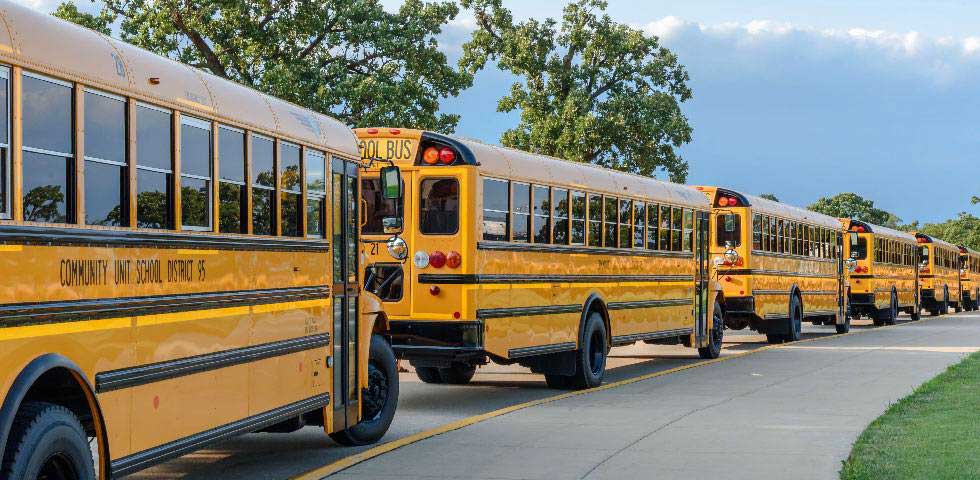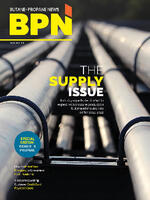
When Independence School District (ISD), located near Kansas City, Missouri, began looking for options to replace the district’s fleet of aging diesel buses, one choice stood out from the rest: propane autogas. “It wasn’t a mandate, but it was a direction we decided we wanted to go in, and the cleaner fuel makes a difference,” said Dr. Lance Stout, ISD deputy superintendent of operations.
The district, which is made up of 30 buildings and approximately 9,500 students, runs about 100 routes per day, including special needs and early childhood. Its fleet of 128 buses now includes 11 Blue Bird propane buses. ISD chose Ferrellgas to build the fueling infrastructure and provide the fuel. The district now has one station with two fuel pumps and an 18,000-gallon tank at its transportation facility.
ISD partnered with the Missouri Propane Education & Research Council (MOPERC) to make use of the council’s rebate program, which allowed the district to realize savings when making the switch to autogas. The following are a few relevant stats:
- 10,000 to 12,000 miles traveled per bus, per year
- Approximately 3,000 gallons of propane autogas per vehicle, per year
- $2,000 estimated annual reduction in fuel costs per bus, per year
The school district plans to add 10 more autogas school buses per year. In the following article, BPN talks with MOPERC President Steve Ahrens and ISD Director of Transportation Daryl Huddleston about the partnership.
BPN: Can you give us a brief background of MOPERC and the autogas program?
SA: MOPERC is a not-for-profit organization created by state statute to implement research, development, education and marketing programs for the benefit of Missouri’s propane consumers. In 2017, MOPERC committed $1 million to support school districts in their adoption of propane school buses. Our program is designed to supplement the state of Missouri’s VW Environmental Trust Mitigation plan. We offer $2,000 rebates per bus, for up to 10 buses per district per year, with a total annual budget of $100,000. We anticipate making this funding available for the life of the state VW program, which ends in 2027.
Since we began the program, we have provided $84,000 in funding that helped put 42 buses into service. Last year, we also created a separate funding mechanism for schools that lease-purchase their fleets. The Diesel Replacement Initiative and Value for Education (DRIVE) program offers no-cost financing for qualifying acquisitions.
BPN: What did the MOPERC funding process look like for this project?
SA: We’re delighted that ISD has taken advantage of our rebate program for two years in a row. This underscores the reliability of the vehicles, fuel and benefits to the district of operating autogas equipment. The process for districts to access the rebate program is extremely simple: The school official or their bus contractor lets MOPERC know they are acquiring propane buses, and we set aside the funding.
BPN: What strategy does MOPERC have in place that other associations can adopt for use in their own school districts and local municipalities?
SA: MOPERC’s goal in the autogas market is to make sure propane is seen as a reliable and trusted fuel. Our aim is to normalize the reality of propane vehicles — that we aren’t an experimental gimmick but instead represent cutting-edge technology. The incentive programs give us the opportunity to begin conversations that create a favorable sales climate with potential customers.
It’s interesting to note that some schools have added propane buses even without the incentive. For example, the contractor who operates the buses for Kansas City’s public schools made the decision to use propane, unaware of our rebates. The bottom-line savings and benefits were so compelling that our incentive was nice, but not critical.
BPN: What advice do you have for adapting conversations to this particular audience?
SA: We don’t sell propane or propane-powered vehicles, so we rely on vehicle manufacturers and propane retailers to make the sales calls and facilitate the adoptions. Our outreach consists of maintaining visibility and awareness of our product and its benefits.
MOPERC has sponsored webinars; provided speakers and exhibits at school organization events; written blog and social media posts; engaged in postcard, letter and email campaigns to various school audiences; and secured state and trade media coverage about propane school buses. We want to provide “air support” where it will do the most good and then rely on industry experts to fine-tune the approach.
An important aspect is sharing autogas success stories since the experiences of their peers is a critical factor for transportation directors and superintendents. In the school bus market, we’ve found that once one district realizes the benefits of propane buses, others in the area are more likely to consider them when it’s time to replace an aging diesel bus.
BPN: Why is it important that local and state groups take an active role in promoting autogas?
SA: The autogas market is not the kind of business you can earn with a brochure. We believe the industry’s best chance to win this business is to provide demo vehicles and on-site fueling to allow the customer to understand the actual ease and savings of propane vehicles.
Therefore, MOPERC has made a substantial commitment to reach beyond schools and into the transit market. We are partnering with a manufacturer to purchase a propane-powered paratransit vehicle for local demonstrations. We will support those opportunities with mobile fueling infrastructure. And we’ve extended our $2,000-per-vehicle rebates for transit vehicles as well.
Our transit outreach is a sizable expense, but the opportunity is urgent. Given the Biden Administration’s stated goals to reduce emissions, which puts diesel and gasoline vehicles in the crosshairs, we believe propane is positioned as the best alternative to battery-electric fleets due to the high cost of electric vehicles and charging infrastructure. Our commitment is to target the highest Missouri transit priorities but also to make this equipment available to other states that want to partner in the effort.
BPN: What are the benefits of making the switch from diesel to autogas?
SA: The focus on reduced emissions often results in favorable comparison for propane autogas vehicles over diesel units, but it’s hard for many to visualize nitrogen oxide reductions or carbon footprint data.
What we hear most often — every time, actually — from bus drivers is their appreciation of the reduced noise level in propane buses that lets them operate more safely and the quick heating, which makes the cabin comfortable on cold days. Some districts in northern Missouri have to run their diesel buses all night in order to ensure that they’ll be available for morning routes, but propane drivers love just turning the key and starting up.
BPN: What challenges make school districts a perfect autogas customer?
SA: Propane’s drawback in the school market is that it is too perfect. When every single feature is superior to what they are currently using, districts think there must be a catch.
The challenge is to let school and municipal customers know that propane has been doing the job quietly and effectively for years in applications just like theirs, and that making the decision is not a leap of faith but, rather, the best solution to a problem that isn’t going away. Electric vehicles get so much publicity that they are seen as the default option, so we need customers to see, feel, drive and hear propane vehicles to understand that there is a better choice.
BPN: What were the top reasons for switching from diesel to propane?
DH: The top two reasons were fuel cost savings and environmental impact. Propane buses significantly lower emissions, as well as maintenance and fuel costs, compared to their diesel counterparts. The transition from diesel to propane improves operational and financial efficacy of the district’s transportation.
BPN: Can you discuss your strategy of adding 10 propane buses per year?
DH: The budgetary component to this process allows the district to spread out the expense.
The ISD purchased the ten initial propane buses and fueling station using a MOPERC and an EPA Region 7 DERA (Diesel Emissions Reduction Act) grant received through Leonardo Academy. The ISD hopes to replace more diesel buses with propane buses over time.
BPN: Is the refueling infrastructure something that is easily replicated in other locations across the district?
DH: The refueling station is located at our bus lot where all ISD buses return on a daily basis. While the refueling infrastructure could be replicated, our current refueling station will serve our needs for the foreseeable future without the need to expand.
BPN: What barriers do you think remain for school districts that have considered autogas?
DH: Infrastructure costs could create barriers for school districts.
BPN: How can propane companies help navigate those challenges?
DH: Grant opportunities help with the initial costs of transitioning to propane-powered buses and eliminate some of the barriers districts may face.


